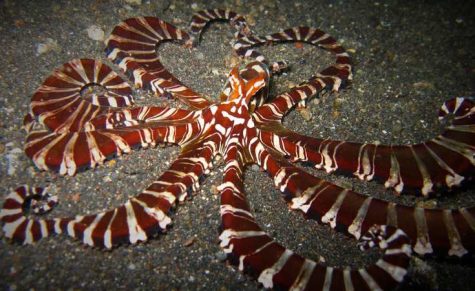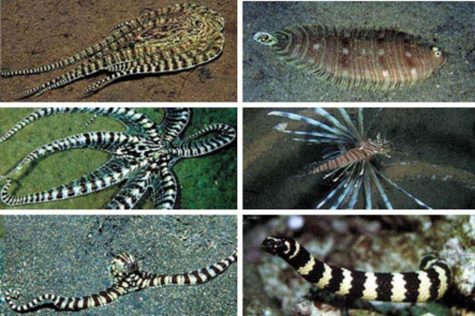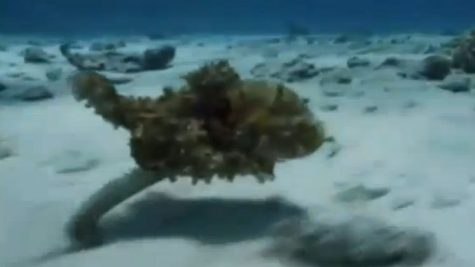The Inarguably Coolest Animal on the Planet
In the last issue of The Talon, I wrote about my affinity for monkeys. However I am sorry to say that neither monkeys, nor humans, are the coolest animal on earth. I must first make a distinction between what the “coolest” animal is and what one’s “favorite” animal is. A favorite animal is an opinion derived from personal thoughts and experience. The coolest animal is set in stone and there can only be one. Today I will be presenting facts. There is simply no argument to be had against the most incredible and interesting animal to inhabit this planet.
I am speaking, of course, of the octopus. More specifically, the Mimic Octopus.

I look at the mimic octopus as a poorly written superhero, exhibiting a plethora of superpowers that don’t quite seem like they are related. However, this is not the next Marvel movie we are talking about, so the mimic octopus is just a manifestation of endless awesomeness. Below I will explain these incredible powers and why they are so special.
Color and Texture Change:
The octopus is famous for its color-chaning abilities, but how it does so is what makes it so incredible. There is something especially fascinating when considering that the simple thought of the colors of the environment around you can completely change your skin. That is exactly how it works, too. Octopi are extremely intelligent, so they can quickly analyze their environment and chose their pigment at will. They do this with a special cell lining their body called chromatophores (cells that are able to alter their own pigment). Unlike chameleons or other cephalopods, octopi have nerves linked to every individual chromatophore so they can change in an instant. This phenomenon is still being studied. Recent findings suggest that octopus chromatophores can change in immediate response to the light around them, almost as if there are microscopic eyes scattered across the creature’s skin.
In addition to all of this incredible ability, many do not know that octopi can also change the texture of their skin. In a similarly fascinating fashion to their color-changing ability, octopi can observe their environment and mimic its formation. Scientists are still studying exactly how an octopus can so accurately depict its surroundings – it’s almost as if the creature was already a piece of the oceanfloor to begin with.
Shapeshifting:
 This ability is what truly sets the mimic octopus apart from the broader family of octopi. The creature is not only capable of copying the rock and sand in its surroundings, but the other species and their behaviors. The mimic octopus can shift into several different forms, many reflecting the form of poisonous sea creatures (see image to the right). This includes the venomous flatfish, lion fish, and sea snake.Most fascinating is the fact that the mimic octopus has been observed taking the form of species we cannot identify. This means one of two things: the octopus is mimicking species
This ability is what truly sets the mimic octopus apart from the broader family of octopi. The creature is not only capable of copying the rock and sand in its surroundings, but the other species and their behaviors. The mimic octopus can shift into several different forms, many reflecting the form of poisonous sea creatures (see image to the right). This includes the venomous flatfish, lion fish, and sea snake.Most fascinating is the fact that the mimic octopus has been observed taking the form of species we cannot identify. This means one of two things: the octopus is mimicking species that we have not discovered OR the octopus is creating its own creatures (both of these are absolutely fascinating possibilities). To the left is an image of the mimic octopus transforming itself into what appears to be a two-legged alien as it runs across the seafloor.
that we have not discovered OR the octopus is creating its own creatures (both of these are absolutely fascinating possibilities). To the left is an image of the mimic octopus transforming itself into what appears to be a two-legged alien as it runs across the seafloor.
Super-intelligence:
The octopus is especially interesting in that it developed a complex brain whilst also being extremely distance from humans on the evolutionary tree. Octopi exhibit various intelligent behaviors, such as being able to carry shells for protection, open jars to find food, and set time aside from survival to focus on playing and communication.
Dr Wen-Sung Chung studied the behavior of various octopi and found that their complex brain structure spreads throughout their entire body. Yes, octopi have brain matter and neurons in their arms (this is why the arms almost behave as if they are individual organisms – they are actually thinking). In 2016, the staff at the New England Aquarium were puzzled as to why various exotic fish species were disappearing over the corse of several weeks. After setting up security cameras and analyzing a slimy trail that always led to the fishtanks, they discovered that a member of the nearby octopus exhibit was escaping from its tank at night to get some extra food. The discovery was too late, as the octopus escaped from its tank one night and slithered through a nearby drain and into the ocean.
Ink:
As if the octopus was not already cool enough: ink. Poisonous ink. What a fascinating animal.







